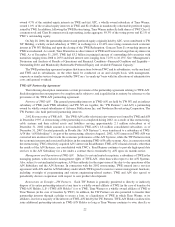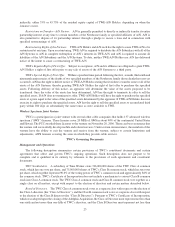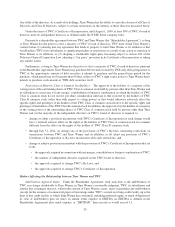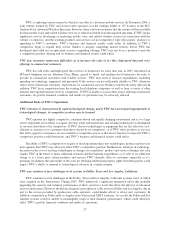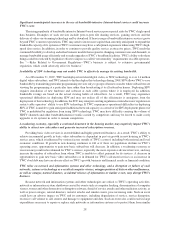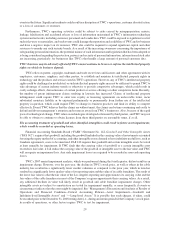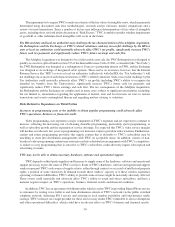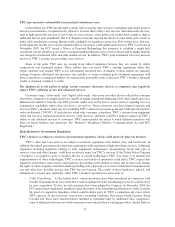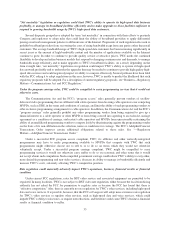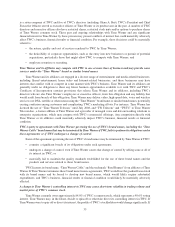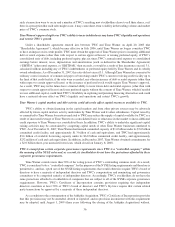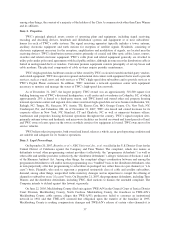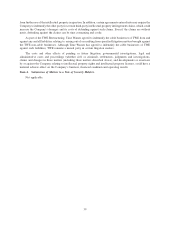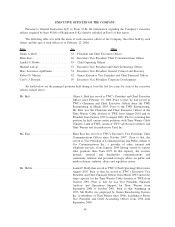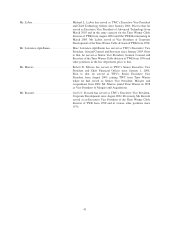Time Warner Cable 2007 Annual Report Download - page 37
Download and view the complete annual report
Please find page 37 of the 2007 Time Warner Cable annual report below. You can navigate through the pages in the report by either clicking on the pages listed below, or by using the keyword search tool below to find specific information within the annual report.pending or may be enacted in additional states. To the extent federal or state laws or regulations facilitate
additional competitive entry or create more favorable regulatory treatment for new entrants, TWC’s
operations could be materially and adversely affected. See “Business—Regulatory Matters—State and
Local Regulation.”
•A la carte Video Services. There has from time to time been federal legislative and regulatory interest in
requiring cable operators to offer historically bundled programming services on an à la carte basis, which
could alter the cost structure of TWC’s services. Currently, no such legislation is pending and there are no
pending proceedings related to à la carte video services at the FCC, although the FCC is examining the
question of whether programming must be sold to MVPDs at the wholesale level on an unbundled basis.
•Voice Communications. Traditional providers of voice services generally are subject to significant
regulations. It is unclear to what extent those regulations (or other regulations) apply to providers of
nontraditional voice services, including TWC’s. In orders over the past several years, the FCC subjected
nontraditional voice service providers to a number of obligations applicable to traditional voice service. To
the extent that the FCC (or Congress) imposes additional burdens, TWC’s operations could be adversely
affected. See “Business—Regulatory Matters—Regulation of Telephony.”
Changes in carriage regulations could impose significant additional costs on TWC.
Although TWC would likely choose to carry the majority of primary feeds of full power stations voluntarily,
so-called “must carry” rules require TWC to carry video programming that it might not otherwise carry, including
some local broadcast television signals on some of its cable systems. If the FCC seeks to revise or expand the “must
carry” rules, such as to require carriage of multicast streams, TWC would be forced to carry video programming that
it would not otherwise carry and to drop other, more popular programming, which could make TWC less
competitive. In addition, TWC is required to carry unaffiliated commercial leased access video programming
and, under some of its franchises, public, educational and government access video programming. These
regulations require TWC to use a substantial part of its capacity for this video programming and, for much of
this programming, TWC must carry this programming with little or no payment or compensation from the
programmer. In November 2007, the FCC revised its leased access rules by further lowering the permitted rates
charged to most leased access programmers. As a result of the lower rates, TWC may receive additional requests to
carry programming that is less attractive to its subscribers and, if this occurs, be forced to cease carrying
programming that is popular with its subscribers, which could make TWC less competitive.
TWC’s carriage burden might increase due to changes in regulation in connection with the transition to digital
broadcasting, which is scheduled for February 17, 2009. Beginning on February 18, 2009, cable operators that offer
at least some analog service (i.e., that are not operating “all-digital” systems) will be required to provide subscribers
both analog and digital feeds of must-carry broadcast stations. Currently, this obligation is scheduled to terminate in
February 2012, subject to FCC review. As of February 2008, many of the specifics of how the transition will be
accomplished are still uncertain and, in order for TWC to comply with requirements in connection with the digital
transition, it will need to work with broadcasters who may not be ready to meet the regulatory requirements. In
addition, while cable operators are required to provide subscribers both analog and digital feeds, there is no
requirement that the broadcasters provide the analog signal to the cable operator. As a result, TWC may be forced to
convert digital signals to analog feeds, which may increase TWC’s costs. In addition, several of TWC’s smaller
systems may lack capacity to carry both analog and digital feeds of must-carry broadcast stations. If TWC is unable
to obtain a waiver of this requirement for these systems from the FCC, TWC may be forced to invest capital to
upgrade these systems, sell them or shut them down, or be required to drop other, more popular programming, in
order to carry the dual feeds.
As a general matter, if TWC’s government-imposed carriage burdens become more onerous, TWC could be
compelled to carry more programming over which it is not able to assert editorial control and to cease carrying
programming that is popular with subscribers. Consequently, TWC’s mix of programming could become less
attractive to subscribers. Moreover, if the FCC adopts rules that are not competitively neutral, cable operators could
be placed at a disadvantage versus other multi-channel video providers.
32


